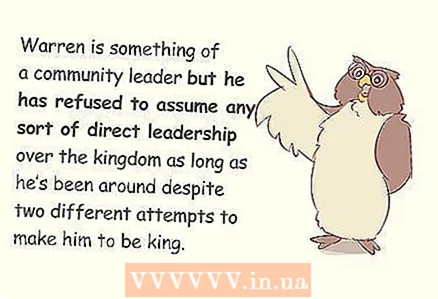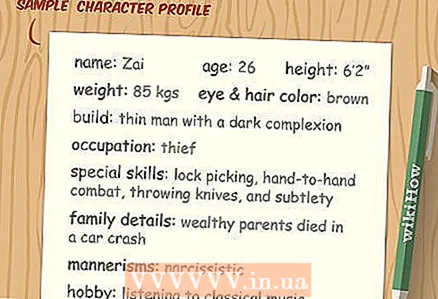
Content
- Steps
- Method 1 of 3: Create an attractive character
- Method 2 of 3: Create a Character Profile
- Method 3 of 3: Make changes as you write
- Tips
- Warnings
Creating a character while writing a book, story, or screenplay can be fun and challenging! But on the other hand, it's a little scary, because there is so much to consider. Among other things, when creating a character (be it a protagonist or a villain), it is important to endow him with attractive, unique character traits and find a way that allows you to keep everything in control.
Steps
Method 1 of 3: Create an attractive character
 1 Assign to characters names that fit your story. Every character in a story should have a name, no matter if it is the main character or the minor one. Moreover, each name must fit into the history and era.For example, if the action is set in 17th century Ireland, the name "Bob" will sound implausible, but the name "Aidan" is extremely appropriate. A woman born in post-war Moscow is unlikely to be called Agafya, but she can be Valentina or Svetlana.
1 Assign to characters names that fit your story. Every character in a story should have a name, no matter if it is the main character or the minor one. Moreover, each name must fit into the history and era.For example, if the action is set in 17th century Ireland, the name "Bob" will sound implausible, but the name "Aidan" is extremely appropriate. A woman born in post-war Moscow is unlikely to be called Agafya, but she can be Valentina or Svetlana. - Or, if you are writing about a group of close friends, do not give them similar names, for example, do not write about three girls named Maria, Mari and Marika.
- Even if you end up not using someone's name in the story, such as a minor character, it will be helpful for you as a writer to know that name so that you don't confuse details when rewriting or editing your work.
 2 Give them a rich inner world and character quirks to keep the reader interested. Give characters personality traits and certain quirks, such as always drinking coffee with honey and cream instead of sugar and cream. Here are some questions to help you get started on shaping some of the traits:
2 Give them a rich inner world and character quirks to keep the reader interested. Give characters personality traits and certain quirks, such as always drinking coffee with honey and cream instead of sugar and cream. Here are some questions to help you get started on shaping some of the traits: - Are they extroverts or introverts?
- If they like music, which one?
- What do they do in their free time?
- What do they do before going to bed?
- Do they have any dietary restrictions?
- Another fun way to get into a character is to take personality tests on their behalf. Perhaps you will make some amazing discoveries.

Julia martins
Bachelor of English, Stanford University Julia Martins is an aspiring writer currently based in San Francisco, California. Graduated from Stanford University with a BA in English. Has published in Cornell University's Rainy Day, Stanford University's Leland Quarterly, and Bards and Sages Quarterly. Julia martins
Julia martins
Bachelor of English, Stanford UniversityThe writer Julia Martins says: “After you have defined the character of the character as a whole, think about what makes him unique. Perhaps he is very close to his grandmother? Does he hate the color green? Crying whenever you watch a sad movie? Even if not all of these details are included in your story, knowing them before you start will help you create a realistic, clear portrait of your character. ”
 3 Give him a unique voice. Chances are, your character's voice will be different from yours, and to create a vibrant character, you need to decide how he will sound and convey that sound in his speech. Explore different dialects depending on when and where your story takes place, and listen to conversations when in public for inspiration.
3 Give him a unique voice. Chances are, your character's voice will be different from yours, and to create a vibrant character, you need to decide how he will sound and convey that sound in his speech. Explore different dialects depending on when and where your story takes place, and listen to conversations when in public for inspiration. - It can be very helpful to re-read your favorite story and see how the author conveyed the characters' speech.
- Instead, you can try recording your conversation with a friend in order to study various features of speech: how often do you pause, when intonation changes, how fast do you speak? Use these metrics to create a character's speech.
 4 Make your character vulnerable to create empathy in the reader. This can be an emotional or physical vulnerability, such as a character coping with a recent loss, or a superhero who loses his hearing when exhausted. To create a multi-faceted, holistic, lovable character, you need to endow him with the vulnerabilities that we all have.
4 Make your character vulnerable to create empathy in the reader. This can be an emotional or physical vulnerability, such as a character coping with a recent loss, or a superhero who loses his hearing when exhausted. To create a multi-faceted, holistic, lovable character, you need to endow him with the vulnerabilities that we all have. - You can also try writing a scene in which a character shares something (such as fear or anxiety) with another character to emphasize their humanity.
- Even if you're describing a villain, find a way to give him at least an ounce of humanity. Making the reader understand the villain's feelings or motives will add tension to the story and make it more interesting to read.
 5 Include flaws and failures to demonstrate the character's human qualities. Perhaps the protagonist is quick-tempered or tends to forget about his friends.If it is endowed with only positive traits (such as love, courage, intelligence and attractiveness), it will become boring and uninteresting for the reader.
5 Include flaws and failures to demonstrate the character's human qualities. Perhaps the protagonist is quick-tempered or tends to forget about his friends.If it is endowed with only positive traits (such as love, courage, intelligence and attractiveness), it will become boring and uninteresting for the reader. - Think about how you can demonstrate flaws without talking about them. For example, by writing, “Anna ate her own supper first, instead of feeding the children first,” you could describe the place where this scene takes place.
 6 Give your character motivation and purpose to develop the story. Think about why your story is important to your character. How was he involved in it? Is it a love story, an epic adventure, a sci-fi thriller? What can the character lose or gain in the end? Character goals are key to writing a compelling story, so work hard to create an active, engaged character.
6 Give your character motivation and purpose to develop the story. Think about why your story is important to your character. How was he involved in it? Is it a love story, an epic adventure, a sci-fi thriller? What can the character lose or gain in the end? Character goals are key to writing a compelling story, so work hard to create an active, engaged character. - Is your character looking for something? What will he lose if he fails? Did other people influence his failure or success? These are great questions to consider when writing a story.
- The character must take an active part in the story. It is not enough that different things just happen to him. So think carefully about what is at stake.
- Think about your favorite characters from books, TV shows or movies: what situations do they face and how do they react to good and bad scenarios?
Method 2 of 3: Create a Character Profile
 1 Come up with a system to keep track of the profile of each character. A character profile is a place where important details and dates associated with each character in a story are stored, from what they are allergic to, to significant dates (when something really important happened). Make a questionnaire for every character, even the most insignificant. There are many ways to organize information:
1 Come up with a system to keep track of the profile of each character. A character profile is a place where important details and dates associated with each character in a story are stored, from what they are allergic to, to significant dates (when something really important happened). Make a questionnaire for every character, even the most insignificant. There are many ways to organize information: - keep a folder with notes for each character;
- create a notebook where the details related to the character will be kept;
- use a Word document on your computer;
- use the "Notes" function on your smartphone;
- write the details on stickers and post them on the wall to demonstrate character development.
You can find ready-to-fill character questionnaires online. Look for as specialized or general as you need!

Julia martins
Bachelor of English, Stanford University Julia Martins is an aspiring writer currently based in San Francisco, California. Graduated from Stanford University with a BA in English. Has published in Cornell University's Rainy Day, Stanford University's Leland Quarterly, and Bards and Sages Quarterly. Julia martins
Julia martins
Bachelor of English, Stanford University 2 Start to compose character profileeven if you don't know all the details. Sometimes the details become clear already in the middle of the story. However, write down any elements that you have already decided on. Here's what to include:
2 Start to compose character profileeven if you don't know all the details. Sometimes the details become clear already in the middle of the story. However, write down any elements that you have already decided on. Here's what to include: - Name, age, occupation, special skills, education, family information, height, weight, eye and hair color, manners, habits, and important dates.
- There are so many details to add that many of them may never make it into your story. But the mere fact that you know them will help you create a more versatile and believable character. Look online for more information on what you can include in your hero's profile.
 3 Think about what type of story you are in to guide your characters. Did you start your project with a great idea? Or were you inspired by an amazing character, but haven't quite decided on the plot yet? There is no right answer here! However, it is helpful to think about which direction the story will take and how the character lives in this world. Add these details to the character profile.
3 Think about what type of story you are in to guide your characters. Did you start your project with a great idea? Or were you inspired by an amazing character, but haven't quite decided on the plot yet? There is no right answer here! However, it is helpful to think about which direction the story will take and how the character lives in this world. Add these details to the character profile. - For example, if you have an awesome love story idea and already know some of the plot twists, write them down and see if the character fits in there. If you want a romantic protagonist who will do extravagant acts, then it would be illogical to endow him with forgetfulness or slovenliness.
 4 Before you get started, spend some time building the world. Whether you're writing something that takes place in the modern world or a story that takes place on a fictional planet, it's important to think about the physical space in which your character will live. For example, what does his house look like? Or how does he move from place to place?
4 Before you get started, spend some time building the world. Whether you're writing something that takes place in the modern world or a story that takes place on a fictional planet, it's important to think about the physical space in which your character will live. For example, what does his house look like? Or how does he move from place to place? - Here are other aspects to help determine if this world is different from ours or if history takes place in a different time: government, social classes, job structure, economy, cultural norms, modes of transport, living conditions, historical events, laws, recreation and food.
- This is the world your character will live in. And he can really influence the formation of the hero, so it will be extremely useful to think over some information in advance.
Method 3 of 3: Make changes as you write
 1 Listen to your character and make changes if necessary. No, without exaggeration. Read your work out loud and listen to how your character sounds. Pay attention to the dialogue and how it flows, and listen to the descriptions of the characters. When you hear what it sounds like, you know where it might be worth adding detail or even removing duplicate passages.
1 Listen to your character and make changes if necessary. No, without exaggeration. Read your work out loud and listen to how your character sounds. Pay attention to the dialogue and how it flows, and listen to the descriptions of the characters. When you hear what it sounds like, you know where it might be worth adding detail or even removing duplicate passages. - In addition, there are some programs that can read your documents to you. Check if there is such a function in the program you are using to write history.
 2 Pay attention to minor characters: they can be important. In the course of work, you may find that the secondary character plays a larger role than you thought, or, conversely, the potential main character ultimately turns out to be not so significant. Use character profiles to track and work through these changes instead of trying to impose roles on the characters.
2 Pay attention to minor characters: they can be important. In the course of work, you may find that the secondary character plays a larger role than you thought, or, conversely, the potential main character ultimately turns out to be not so significant. Use character profiles to track and work through these changes instead of trying to impose roles on the characters. - For example, J.K. Rowling had several "minor" characters such as Neville Longbottom and Dean Thomas. Initially, they were given a much more important role in the Harry Potter universe, but, as the story progressed, the author reduced their importance.
 3 Spend more researchif the character finds himself in unusual situations. Your character needs to be good at what he does, and if you find yourself writing about something that you are vaguely familiar with, it will make the character superficial. For example, if you are writing about sword fighting but your character only knows how to fire a weapon, do some research on sword fighting to make your story and your character more believable.
3 Spend more researchif the character finds himself in unusual situations. Your character needs to be good at what he does, and if you find yourself writing about something that you are vaguely familiar with, it will make the character superficial. For example, if you are writing about sword fighting but your character only knows how to fire a weapon, do some research on sword fighting to make your story and your character more believable. - Situations like this can arise when the hero has to travel to a different location or needs a skill that you don't really have experience with, such as fly fishing or picking locks.
 4 Be prepared to change details as nothing is permanent. Many science fiction writers believe that their characters are telling a story, and sometimes things can change dramatically from start to finish of a project. You may find that the main character should be of the opposite gender (or not at all). Or perhaps you thought that your story would take place in a certain period of time or in a different world, but in the process of writing you came to new discoveries.
4 Be prepared to change details as nothing is permanent. Many science fiction writers believe that their characters are telling a story, and sometimes things can change dramatically from start to finish of a project. You may find that the main character should be of the opposite gender (or not at all). Or perhaps you thought that your story would take place in a certain period of time or in a different world, but in the process of writing you came to new discoveries. - A useful way to avoid feeling like you're losing the narrative thread when making drastic changes is to copy and paste your original work into another document called "clippings," instead of just deleting it.This way you have material in case you want to come back and refer to it when needed.
Tips
- Read more literature in your genre and style. If you write scripts, read paper copies of scripts. If you're writing science fiction, read more science fiction. Whatever you want to do, become an expert in the field by absorbing as much information as possible.
- Remember that writing is a creative art form, so feel free to experiment with your characters.
Warnings
- Do not under any circumstances plagiarize other authors in your work or when creating a character. Sure, you can get inspired by other writers, but let that inspiration lead you to your own unique creations.



